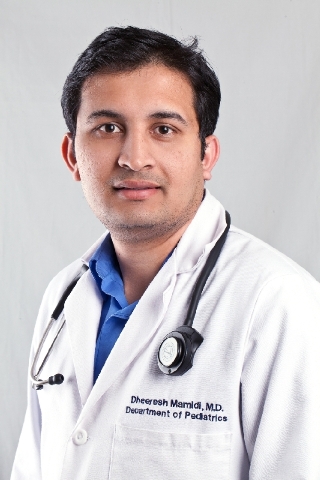Back to school Q&A with Dr. Mamidi
As local families prepare to go back to school next week, the Pahrump Valley Times sat down with HealthCare Partners Pediatrician Dr. Dheeresh Mamidi to talk about how children can stay healthy and what the local school district requires before returning to the classroom.
Q: The Nye County School District requires children to have certain vaccinations before attending school, can you explain what some of those are and when children should get them?
A. Before the start of kindergarten, the school requires children have some vaccinations. Of those, DTap, which is the tetanus and the whooping cough vaccine, they need to have four rounds of that. Hepatitis B, they need three, Hepatitis A they need two. MMR - the measles, mumps and rubella vaccination - they need two of them, they need three doses of the IPV or OPV and they also need two rounds of the Chicken Pox vaccination.
Out of those vaccinations, one dose of the DTap, Polio, MMR and the Chicken Pox vaccination has to be after the fourth birthday. So sometimes the DTap can be five rounds, rather than four, if one of them was before the fourth birthday. Polio is also three or four. If they had the third one after age four that should be good enough.
The DTap, if the fourth one is after the fourth year it’s good enough, but the school is very picky about that. And the first MMR and Chicken Pox need to be after 12 months. And usually we do them at the 12-month check-ups.
Q: Are there any additional vaccinations children need as they get ready to go into the higher grade levels?
A: Going into the seventh grade there are a few more shots required. One of them is the whooping cough booster, DTap, and that is usually given after kids turn 11.
And there is another optional vaccination for school, but it is required for college, and that is the meningitis vaccine, which is also given to kids above 11.
One of the other important vaccines we do recommend for all boys and girls after 11 is the Gardasil HPV vaccine which prevents cervical cancer in girls and can prevent genital warts in boys. It’s a three-dose series, and even though it’s not required yet for school, I think that’s something they should have once they hit the teenage years.
Q: What else do you recommend families do in order to get ready for the upcoming school year?
A: We do recommend well checks every year. That way you can catch up with the vaccinations and the overall health. Sometimes if kids don’t have regular check-ups, there are some diagnoses we can miss.
I think before school is a good time because kids are out of school and we can see what’s the baseline and then we know every year if there are any changes. And also with the well checks, besides the vaccinations, we also do a vision screening and a simple urine dip to check for other things. So it’s important to have well checks every year as well.
Q: Do you have any other tips for kids and families to stay healthy this school year?
A: I think all parents will tell you, you always need to wash your hands, and if you get sick and you’re coughing, try to cough into your elbows. That’s the best way to prevent spreading germs to others.
One other thing I see is one of the places children spread germs is water fountains. So I think if they can, they should get their own water bottle, that would be a good way to avoid some germs.
Also children should have healthy, balanced meals and plenty of water throughout the day. That’s very important. And they should never skip breakfast.
One thing I would also recommend, if they’re sick, especially with a fever, they should take a 24-hour break from school. I know some kids don’t want to skip school, but they can infect or spread germs to others.














